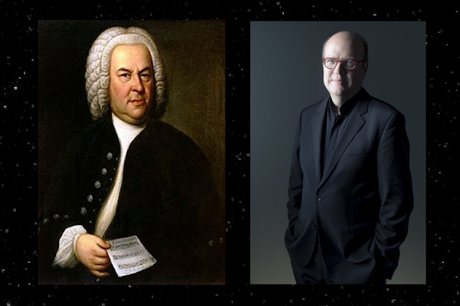by Paul J. Pelkonen

Bernard Labadie (right) leads the new Orchestra of St. Luke's Bach Festival.
Photo by Dario Acosta.
Music director Bernard Labadie took the time to introduce some of the more unusual morsels on the evening's menu. Then the music started. The small OSL orchestra used a mixture of modern and traditional instruments. The result was a slightly dry, middle-sized sound that would prove ideal in support of the human voice. The geometric perfection of Bach's overture writing coalesced in the limited subterranean space of Zankel Hall, elevating the listener from their seats deep below the streets.
Mr. Labadie then led the first unusual dish on his Bach "tasting plate." This was two verses of the aria "Alles mit Gott und nichts ohn' ihn." The aria, written in 1713 but remaining undiscovered until 2005, is just four pages of music for soprano, continuo and strings. However, it is repeated twelve times in an apparent effort at early minimalism. Since the complete work is forty minutes of the same thematic material over and over again, Mr. Labadie and soprano Lydia Teuscher subjected the audience to just two of these verses. This excerpt allowed both singer and instrumentalists passages in which they shone brightly.
Next came a carefully chosen pairing of overture and cantata. First, the Overture from "Die Elenden sollen essen" ("The miserable shall eat") in a bright G major. Second the C major cantata itself, "Jauchzet Gott in allen Landen" ("Exult in God in every land") resounded its bright, uplifting call, again with Ms. Teuscher firmly in the lead. This cantata gave the soprano an opportunity to display her coloratura abilities in the final movement, an "Alleluia" in which her voice dove and scampered, intertwining joyfully with an equally elaborate solo trumpet line.
The second half began with another lengthy introduction from Mr. Labadie. The work being performed was "Tilge, Höchster, meine Sünden", and Mr. Labadie took the time to introduce its tormented musicological history. As he explained it, this was a setting by Bach of the Stabat Mater by Pergolesi, a work that proved ubiquitous in Catholic churches in the early 18th century. Bach re-wrote the piece to a German translation of Psalm 51, more palatable to his Lutheran congregation. In doing so, he changed the music considerably, elaborating on the original orchestration. If you know the Pergolesi it is recognizable but the final effort is uniquely Bach.
With that bit of rigmarole out of the way, this proved to be a lovely and meditative work that captures the reflective spirit of the original. The Stabat Mater is a medieval poem imagining the Passion of Christ from the point of view of the Virgin Mary, weeping at the foot of the Cross. Bach retained the emotional punch of the original but added complex vocal lines for soprano (Ms. Teuscher) and countertenor Benno Schachtner to take full possession of this musical property. The results, delivered in a hushed and meditative Zankel Hall, were much like attending a religious service. One must only express awe at the fervor of the composer's creativity, and at the zeal with which Mr. Labadie and his orchestra brought this rare music back to the population of a cold and cynical metropolis.
The OSL Bach Festival continues over the next three weeks. Two more concerts are scheduled for the Zankel stage, each on Thursday nights. The newly-renovated auditorium at Manhattan School of Music hosts the orchestra playing with the Paul Taylor Dance Group, offering modern-balletic interpretations of the composer's instrumental works. Finally, there is a set of intimate recitals at the DiMenna Center, the excellent modern facility that became this ensemble's permanent home in 2010.
Become a Patron!
Superconductor is free for everyone to read but it does cost money to produce. If you enjoyed this article, it's time to click over to Superconductor's Patreon page, and help support the cost of independent music journalism in New York City. Our Patreon program starts at the low cost of just $5 per month, less than a fancy cup of coffee in this town.

